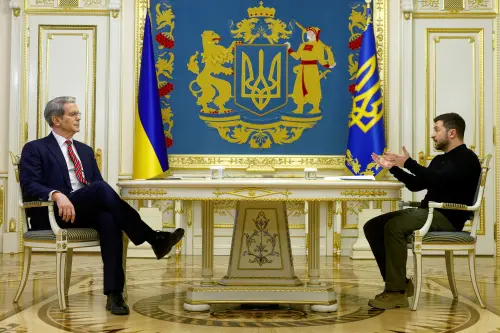Earlier this year, the Washington Post posted a joint article by Presidents Barack Obama and François Hollande. In the piece, entitled “Obama and Hollande: France and the U.S. enjoy a renewed alliance,” the two heads of state say, “Perhaps nowhere is our new partnership on more vivid display than in Africa.” Since the 2011 NATO intervention in Libya, which led to instability in the Sahel region (in particular in Mali) France has increased its leadership role in security and diplomatic issues in sub-Saharan Africa. It has also strengthened its partnership with the U.S. in the region, especially in the fight against terrorism. However, the record of involving African-led troops has been mixed, as illustrated by the ongoing conflict in the Central African Republic (CAR).
As security concerns across the continent—such as those in Nigeria, the CAR, South Sudan and elsewhere—continue to fester, I sat down to answer some questions on the different ways the U.S. and France approach security in Africa as well as how they might work together.
1.
How does France view African security issues?
The French national and defense strategy (as fleshed out in the 2013 Livre Blanc sur la Défense et la Sécurite Nationale) clearly stresses the strategic importance of “Europe’s neighborhood,” which includes the zone “from the Sahel from Mauritania to the Horn of Africa and other regions in sub-Saharan Africa.” The report notes the low capacity of African countries to control their territories, a situation that leads to the illicit trafficking of weapons, drugs and even people. Fragile countries risk becoming a safe haven for terrorists: The crisis in Mali illustrates how such a risk can quickly materialize. The strategy also highlights the fact that instability in the region could slow down Africa’s current high economic growth, especially in countries such as Nigeria. Since a recent report by the French senate clearly indicates the need for France to strengthen economic ties with Africa, especially at a time where China and other emerging markets are doing so, this instability could be costly to France.
France is sometimes criticized by both Africans and experts on the continent for its involvement in sub-Saharan Africa, and some observers have questioned whether President Hollande’s strong re-engagement with Africa heralds the return of Françafrique, a heavy-handed control in the affairs of its former colonies. Memories of French “technical advisers” in African ministries, the close personal ties or animosities between some African presidents and Jacques Foccart (Charles de Gaulle’s chief advisor on African affairs), and the succession of military coups in the 1960s have not completely faded away.
2.
What is the scale of U.S. security involvement in Africa?
The United States Africa Command (AFRICOM) coordinates all operations in Africa and is actually based in Germany. Officially, the U.S. has only one base in Africa, in Djibouti (whose president visited President Obama recently) and a drone base in Niger. This sparse presence is in contrast to the French military’s large one on the continent. On the other hand, the U.S. is present in a large number of African countries at a reduced, more specialized scale where it trains African troops for special operations and conducts intelligence work as well as lays the ground logistically to facilitate eventual future operations). Given the focus of the U.S. on anti-terrorist operations and its massive capabilities (including long-range deployment of troops), this structure may suit the Americans better than the French.
3.
Why is the U.S. more reluctant than France to intervene in Africa?
The U.S. has little appetite for large-scale military operations in Africa. The intervention in Libya confirmed President Obama’s reluctance to send troops into Africa, especially as the drawdown of U.S. troops from Afghanistan was proceeding. The reluctance to send boots on the ground is even higher when it comes to operations in sub-Saharan Africa, especially since the “Black Hawk Down” experience in Somalia. In contrast, the war in Libya highlighted former French President Nicolas Sarkozy’s willingness to affirm France’s leadership role in security and defense issues in “Europe’s neighborhood”—a role it has always had in sub-Saharan Africa judging from the number of its defense agreements and military bases around the continent.
Second, the spillover of the war in Libya to the Sahel region, from Mali all the way to Nigeria and beyond, led President Hollande to significantly strengthen France’s role in sub-Saharan Africa. For instance, France increased its operations in the CAR and opened new bases in Mali. It has even scaled up its diplomatic role outside its former colonies, as illustrated with the visit of President Joseph Kabila of the Democratic Republic of the Congo and the meeting on the fight against Boko Haram with the Nigerian and many francophone presidents. The fallout of the Libya war has also led to an increased partnership between France and the U.S. to fight terrorism, as weapons from Libya were seized by a number of groups leading to further instability in the region.
4.
How do the U.S. and France work together to provide security in Africa?
The U.S. is mostly focused on anti-terrorist efforts against al-Qaida in the Islamic Maghreb (AQIM), Boko Haram or the Lord’s Resistance Army, but the U.S. can offer intelligence and logistical support to the French military. For example, the U.S. provides transport and refueling capabilities to the French. As members of the United Nations Security Council, the two countries also coordinate their strategies regarding U.N. peacekeeping and other operations in Africa, such as sanctions in the CAR. The French are also trying to garner more support in Africa in the European Union (which is present in Mali and in the CAR).
In their Washington Post joint article, Presidents Obama and Hollande say that “across the continent, from Senegal to Somalia, we are helping train and equip local forces so they can take responsibility for their own security.” On the ground, we see different models and a lot of challenges. African-led troops are in the CAR alongside French troops, but success has not yet been achieved, and the Chadian troops have left. In Mali, the government troops are fighting the National Movement for the Liberation of Azawad (MNLA) while French and U.N. troops are also present. On the other hand, the African Union was not invited to Paris for the meeting with Nigerian President Goodluck Jonathan on how to fight Boko Haram. Going forward, it will be important to learn from these recent experiences to come up with an architecture that allows well-equipped African-led troops to be deployed rapidly.
The Brookings Institution is committed to quality, independence, and impact.
We are supported by a diverse array of funders. In line with our values and policies, each Brookings publication represents the sole views of its author(s).


Commentary
U.S. and French Collaboration in Africa: Security and Defense Considerations
June 20, 2014